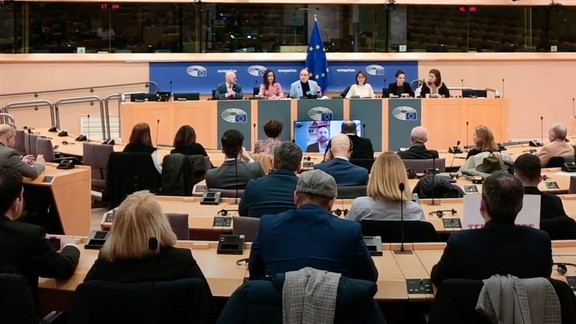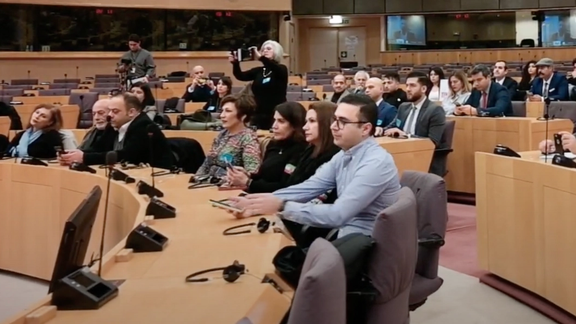European Lawmakers Meet To Further Discuss IRGC Designation

Members of the European Parliament held a meeting in the Belgian capital Brussels to discuss the designation of Iran’s Revolutionary Guard as a terrorist organization.

Members of the European Parliament held a meeting in the Belgian capital Brussels to discuss the designation of Iran’s Revolutionary Guard as a terrorist organization.
Swedish democrat Charlie Weimers, member of Belgian Parliament’s Committee on Foreign Affairs Darya Safai, and Dutch Minister of Justice and Security Dilan Yeşilgöz-Zegerius as well as many other activists such as RAND think tank analyst Alireza Nader and Stockholm-based rights defender Iraj Mesdaghi were among the participants.
The organizers and speakers of the meeting said they gathered together with the aim of providing more information to international and intergovernmental organizations and raise awareness about the reality of the IRGC. The session focused on two issues of the role of the Islamic Revolutionary Guard Corps in suppressing the antigovernment protests by the Iranian people and supplying arms for the Russian invasion of Ukraine.
According to the members of the parliament and political activists, the approval of the 32-point resolution adopted by the European Parliament on January 19, which called on the EU and member states to designate IRGC as a terrorist outfit, did not persuade the EU to take that step.
The European Parliament’s resolution also urged the EU to expand its sanctions list to cover all individuals and entities responsible for human rights violations and their family members, including Supreme Leader Ali Khamenei, President Ebrahim Raisi, Prosecutor General Mohammad Jafar Montazeri and all foundations (‘bonyads’) linked to the Islamic Revolutionary Guard Corps (IRCG).
During the Friday session, Weimers said, “The Islamic Revolutionary Guard Corps – or the IRGC -- stands up on behalf of the mullah's evil republic through tyranny murder and terrorism,” adding that “the IRGC is a force for political terror both at home and abroad.” It has trained, financed, armed and provided a safe haven for groups like Hezbollah, Hamas and Islamic Jihad, which have been listed as terrorists by many countries.
He also called on the EU to permanently suspend the talks to revive the 2015 nuclear deal, expressing regret that many members of parliament still hope that the agreement bears the fruits they seek.
The IRGC supported or motivated terrorist acts abroad, he said, noting that since the IRGC has provided support for assassinations, hijackings, bombings, kidnappings cyber-attacks, espionage, surveillance of Iranian dissidents, propaganda, delivery of explosives and arms all over Europe.
After the session, the Dutch justice minister twitted, “The Iranian Revolutionary Guards terrorize demonstrators fighting for freedom in Iran,” adding, “On behalf of the Netherlands, I again advocated adding the IRGC to the European terrorism list or imposing additional sanctions. We must continue to support the people of Iran.”

The issue of adding the Revolutionary Guard (IRGC) to the list of Europe’s terrorist entities became a rallying point for the Iranian diaspora, which launched online campaigns and held a large protest in Strasbourg on January 16 to lobby the European Parliament for passing the resolution.
The Iranian expatriates and members of the European Parliament also called for another gathering to push for the IRGC terrorist designation in Brussels on February 20.
The IRGC played a major role in suppressing antigovernment protests in the past four months, overseeing several security agencies that have killed over 500 civilians, jailed over 20,000 people and inflicted lasting injuries on hundreds of people.
Many officials of the European Union, including foreign policy chief Josep Borrell, are not in favor of sanctioning the IRGC, as they are concerned that the Islamic Republic will not be forthcoming in nuclear talks with the West. Negotiations that began in April 2021 to revive the 2015 Iran nuclear deal, known as the JCPOA, came to a deadlock last September. In the meantime, Tehran has supplied kamikaze drones to Russia, which are used in attacks on Ukraine’s civilian infrastructure.
The West has stepped up pressure on Iran over its crackdown on protests and arms supply for the Russian invasion of Ukraine as the US, the European Union and United Kingdom imposed fresh sanctions on Tehran. In a retaliatory move, the Islamic Republic also individuals and entities.
Also on Friday, European Parliament President Roberta Metsola condemned the decision of the Iranian regime to sanction several MEPs, as well as journalists, human rights defenders and institutions, underlining that “Women have the right to protest. Women's lives and women’s liberties are inviolable. The European Parliament will not stop fighting for these fundamental values. We will not stop standing up for freedom, dignity and equality. We will not be silenced.”